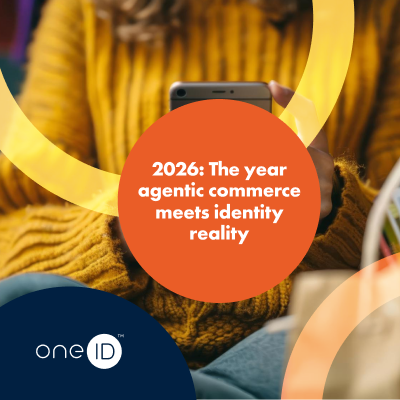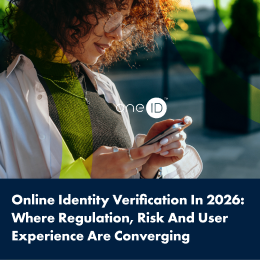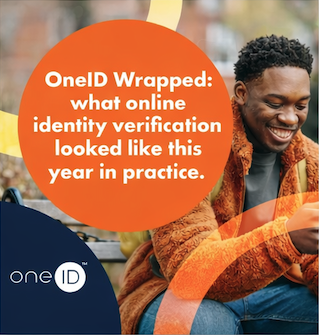If your business sells age-restricted products or services online (think alcohol, kitchenware, and DIY tools), we’ve put together a list of key insights age verification experts think you should know for 2022.
Here at OneID®, we know how important it is that your business, and your customers, are well protected. But verifying someone's age online can often be difficult.
Did you know that fines for not following age rules can be up to 4% of your global annual turnover? Or that multiple new regulations have come in over the past 2 years?
If not, don’t worry - we hosted an informative webinar, Age Verification Essentials: Hear from the experts. We put together a panel of industry experts that could give you the insight you need to make sure your business is up to date with all things age verification.
Moderated by TechUK’s Head of Data Analytics, AI and Digital Identity Katherine Holden, the panel included Tony Allen, CEO and founder of Age Check Certification Scheme (ACCS), and Iain Corby, Executive Director of Age Verification Providers Association (AVPA), as well Gary Humphrey, Head of Product at OneID®.
So, what did the experts highlight businesses need to know for 2022? Here’s a summary of five key highlights that came from the webinar.
When asked about the age verification laws currently in action online, Allen described the complexities.
At the most basic level, the rule is generally that products and services cannot be bought if the customer is under 18.
However, the rules do differ slightly depending on the nature of the product. For example, new rules coming into play as of April 2022 will require retailers of corrosive substances to carry out age verification, both at the point of sale and at the point of delivery.
This means retailers could be prosecuted if they don’t introduce significant age checks, both in their checkout process and upon delivery.
Essentially, it’s important that you carefully research the rules in your industry and for each of your products or services. A great place to start is the AVPA website where you’ll find a summary of legislation for each sector.
Whilst we’re on the subject of the point at which you should be checking age, Allen also advised that verification at the point of sale is the safest method for businesses who want to protect themselves and their customers.
Allen explained why age checks upon delivery are problematic - most companies use couriers to deliver their goods to customers. As such, it’s difficult to know whether age is actually being checked upon delivery. If you haven’t trained delivery staff yourself, you don’t know how they have been trained to complete checks, or if they are given enough time per delivery to complete checks adequately.
Not only is this dangerous for children who may find themselves accepting delivery of your age-restricted goods, but also puts your business in danger of prosecution.
The law requires ‘reasonable precautions and due diligence over delivery processes’, and as Allen explained, “if you haven't got confidence you've taken what the law requires, which is reasonable precautions and due diligence over that delivery process, then you really have to be looking at doing that age verification at the point of sale on an online environment and that will give you greater confidence that at the very least the person that's buying the goods is somebody who is over overly appropriate”.
The webinar panellists discussed numerous rules, laws, and regulations, many of which Iain Corby explained are changing at the moment.
There is lots of legislation coming into force in the next year or two, with some going through parliament currently.
For example, the Age Appropriate Design Code came into force this year, a set of rules and standards dictating how businesses need to make changes to how they collect, store, and utilise customers’ data dependent on their age.
Also known as The Children’s Code, the rules mean that any website that may attract children needs to find a new way of determining the age of their users, as the data of under 18s is highly protected.
Corby also mentioned the audio-visual media services directive, implemented in the UK, the Digital Services Act, formed in Europe, and the Online Safety Bill, explaining they are all about the duty of care, which is greater if you’re dealing with children. “All of this is coming together to say, yeah we need to know the age of our users online” he summarised.
Allen usefully summarised the standards that exist for age verification providers, including the British standard, PAS 1296, the international standard, PWI 7732, and GDPR standards, stating the new solution from OneID® meets each and every one.
Imminent changes are also occurring within specific industries, Allen explained. For example, new sections of the Offensive Weapons Act came into play in July, with further controls to be introduced in 2022, that will mean retailers of knives will have to introduce new precautions such as changes to packaging and delivery methods, at their own expense.
The offence itself hasn’t changed, but the specific rules to be followed have.
Speaking to us previously, Iain Corby said about these changes “Retailers in other age-restricted industries should take note and recognise that taking action to protect underage customers now may help to avoid the introduction of such rigorous regulations in their own industries and the resultant cost impact to their business model”.
Previously, there’s been no correlation between the size of a business and the penalties it receives for breaking rules surrounding age verification.
This has shifted in the past couple of years, as Allen illustrated using B&M Stores as an example. After investigation, they were prosecuted for selling knives to children and fined £350,000.
This introduced a new precedent for the way that trading standards underage offences are dealt with, by tying the penalty to the turnover of the business, increasing fines.
Organisations like the Information Commissioner’s Office (ICO) (those in charge of the Age Appropriate Design Code) and Ofcom set these administrative penalties rather than criminal fines, which can be much more substantial.
Just last week the ICO issued its latest fine against ClearPass for £19 million.
With the grace period coming to an end for businesses to comply with the Age Appropriate Design Code, there’s also an increase in enforcement activity.
Allen revealed that just last week the ICO wrote to 40 companies asking them to detail their approach to the new rules and are collecting evidence against those who aren’t compliant.
He added that the government have granted a significant amount of money to trading standards to bring rules into force this year saying, “You can’t wait till the last minute to switch things on, you need to get ahead of the game.”
For a long time, rules for online retailers have been a lot looser than rules for brick-and-mortar retailers – it’s a lot harder to check someone’s age over the internet than it is to check their ID at the door.
But things have changed, and we know now that regulation online is possible.
More importantly, it’s a necessity.
Allen summed up this sentiment, saying governments and regulators are thinking “if it's illegal offline, it should be illegal online”.
With new consumer behaviours come new rules, new penalties, and new levels of enforcement. If online retailers don’t want to get caught out, they need to make sure they’re up to date with age verification changes in the UK.
So, that rounds up the five things age verification experts think you should know for 2022. If you want to hear more from our webinar, including a demo of OneID®, a new age verification solution approved by the ACCS, you can watch it here.
If you’d like help understanding how your business can implement age verification safely, without creating hassle for your customers, book a no-commitment chat with one of our team members below, or explore age verification with OneID for yourself here.

Agentic commerce is already operating inside live retail, payments, and platform environments. For Partn...

Online identity verification entered a new phase in 2025. Across adult platforms, gambling, financial se...

Last month, we joined Turnkey for an industry event to talk about a challenge many regulated platforms a...

2025 has been a year of continued growth and real-world proof for OneID®. As expectations for identity a...